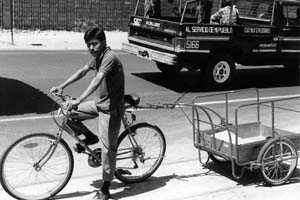
Research & Professional Activity
SALVADORAN CENTRE FOR APPROPRIATE
TECHNOLOGIES (CESTA)
Opportunities for Research
in the Developing World
This spring, the Faculty was visited by Dr. Ricardo Navarro, an internationally recognized environmentalist from El Salvador. More than a decade ago, in the middle of El Salvador's 13-year civil war, Dr. Navarro organized a grass roots conservation group: the Salvadoran Centre for Appropriate Technology (CESTA).
In May 1995 Dr. Navarro was named as a recipient of the United Nations Environment Program's Global 500 award which recognizes environmentalists. He was also awarded the prestigious Goldman Foundation Environmental Award, considered the environmental equivalent of the Nobel Peace Prize.
CESTA is a non-profit organization working to promote community-based strategies to reverse past environmental destruction and prevent future degradation in El Salvador through partnership with urban and rural communities working on national public education programs, ecological rehabilitation, and the promotion of national policies that support sustainable societies.
Their work fills a great need in El Salvador, a country where only 2% of the original forest cover remains, 90% of water supplies are significantly contaminated, and the leading cause of death in children under the age of five is respiratory illness caused mainly by severe air pollution.
 |
| Postcard from El Salvador |
It is Dr. Navarro's hope that the developing relationship between CESTA and the Faculty of Environmental Design will encourage faculty and students to participate in CESTA's ongoing projects as well as to facilitate a reciprocal transfer of knowledge and experience. To this end, Dr. Navarro met with Bill Ross, Stuart Walker and a representative of the EVDS Student Association during his visit.
CESTA currently has 82 employees involved in projects as diverse as hatching endangered sea turtle eggs, planting 15,000 trees in a "Forest of Reconciliation", popularizing composting toilets, teaching adobe and other inexpensive building techniques, and introducing new nutritional food crops such as Soya beans.
CESTA also runs a bicycle factory in the capital city of San Salvador that produces not only thousands of bicycles every year but other pedal powered technologies such as corn grinders, wheel chairs for war amputees and veterans, air compressors, delivery carts and rickshaws. CESTA is constantly researching new ideas and has even developed a pedal-powered portable dental drill for use in rural communities!
Current students of EVDS or alumni interested in learning more about CESTA projects and possible MDP topics are encouraged to contact Fiona Chambers, an EVDS student who has been actively involved with CESTA for the last four years.
[ Top of Page | Table of Contents | Intervention | Previous Article | Next Article ]